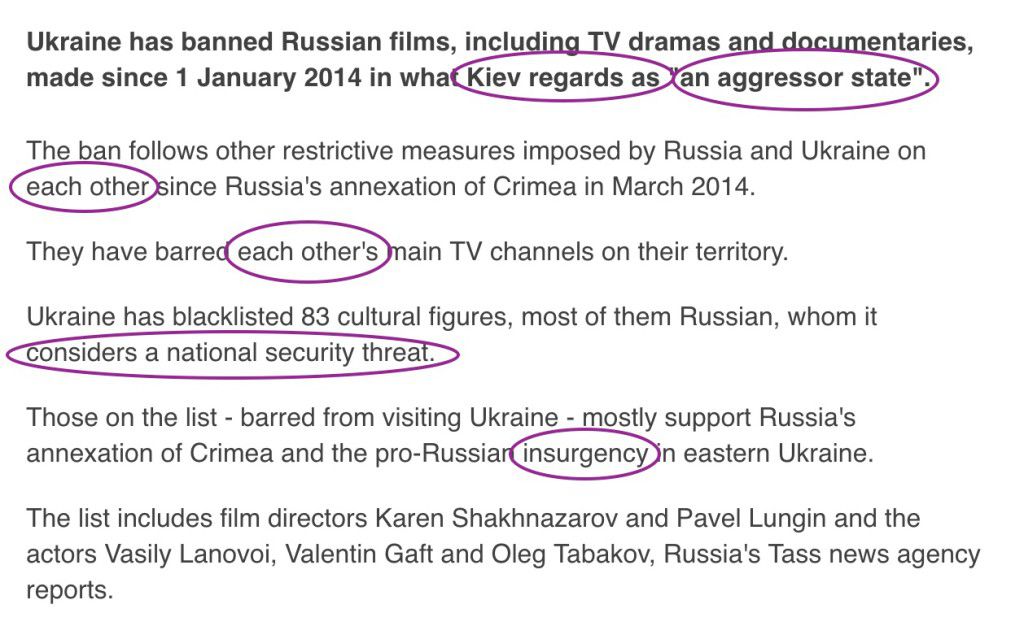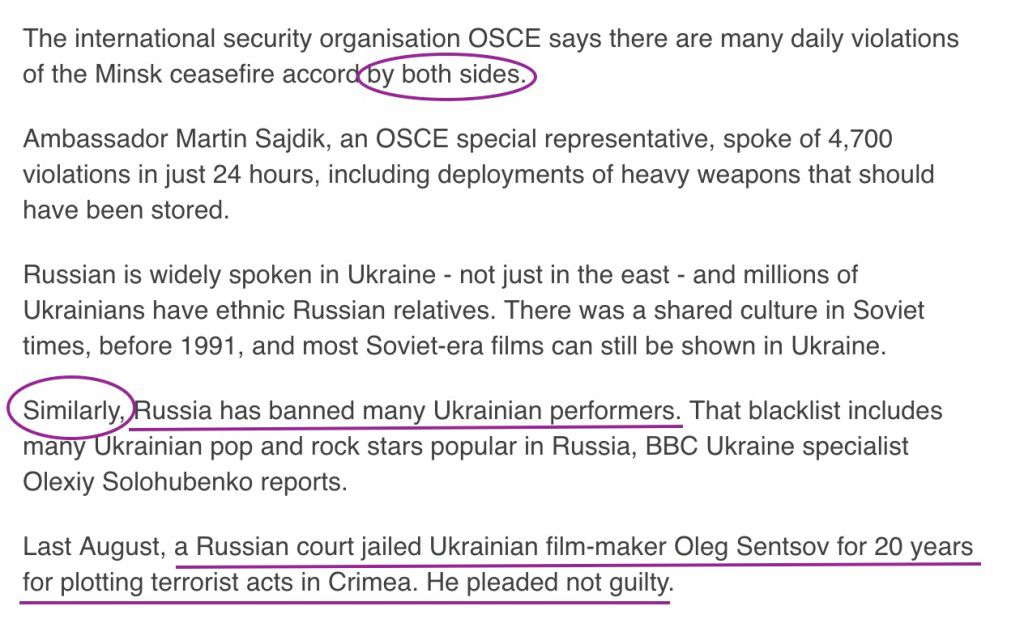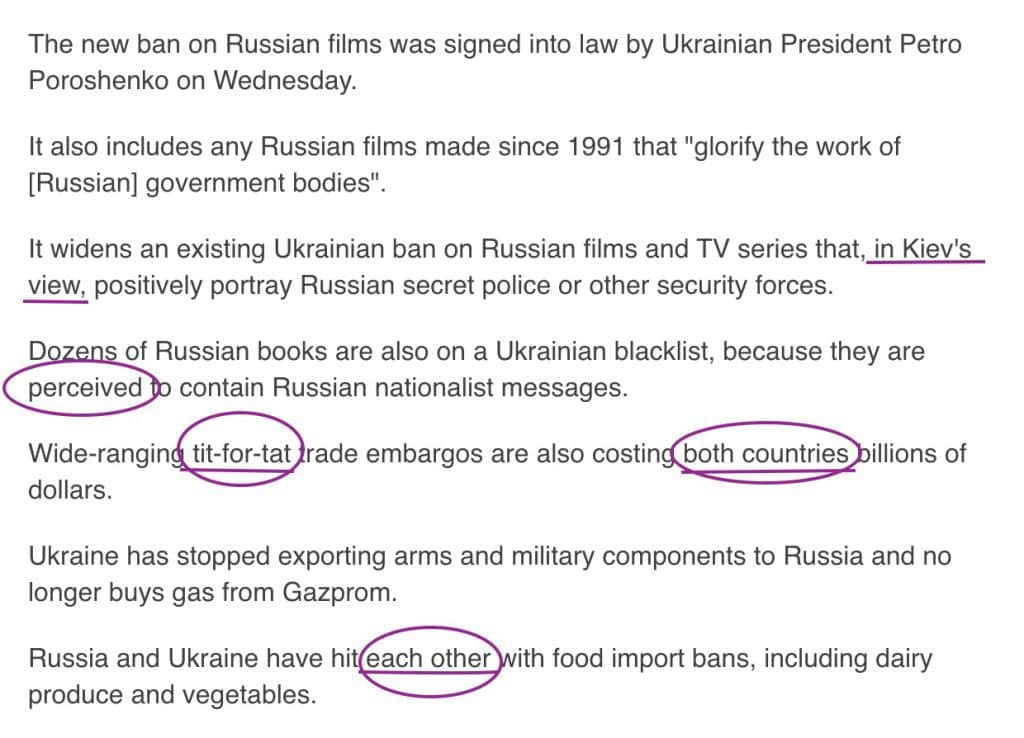Over the past two years, much has been written about the “Ukraine crisis”. This phrase is, in fact, a euphemism, used purposefully by some and sloppily by others. In both cases, however, use of the euphemism “crisis” diminishes, distorts and distracts from the reality in Ukraine. And the reality is that the “crisis” in Ukraine is Russia. Russia compelled the annexation of one region of Ukraine – Crimea – and invaded and occupied another region – the Donbas. Indeed, Russia created a crisis of the worst sort – war.
There is plenty of reliable eyewitness and documentary evidence of Russia’s war in Ukraine. We’ve seen Russian soldiers, Russian weapons, and Russian tanks crossing into a sovereign European nation’s internationally recognized border. Furthermore, Russia’s war has been purely aggressive and unprovoked. Ukraine didn’t fly planes close to or inside Russian airspace. Ukraine didn’t kidnap Russian citizens. Ukraine didn’t claim Russian territory nor did it even threaten to claim an inch of Russian territory.
Crisis or War. Yet despite the overwhelming evidence of a war on Ukrainian territory – an aggressive, unprovoked war, begun by Russia, financed by Russia and largely lead and fought by Russians, much of the media continues to use the language of “crisis” rather than the language of “war.” We can speculate why the euphemism of “crisis” is preferred to “war,” but whatever the reasons, there can be no doubt that “crisis” is the preferred term in Russian media. And there are reasons for this. War refers to a relatively concrete set of hostile acts. The euphemism “crisis” on the other hand creates a kind of distance from the reality of war’s violence. “Crisis” also invokes a sense of complexity, perhaps even of murky, difficult to understand events.
The use of the euphemistic “crisis” for Russia’s war in Ukraine works to divert attention from the very concept of responsibility in general, and in Russia as a responsible party, specifically.
More significantly, however, the use of the word “war” entails specific, identifiable parties to the war. “Crisis” does not necessitate identifying the parties or even determining the aggressor. A messy, murky crisis can exist independent of an aggressor. Thus, the use of the euphemistic “crisis” for Russia’s war in Ukraine works to divert attention from the very concept of responsibility in general, and in Russia as a responsible party, specifically. Once our attention shifts away from Russia, the door is then open to the Kremlin’s own alternative narrative.
This is precisely what we’ve seen for two years: Russia issues one incredulous denial after another that it is not the aggressor of war in Ukraine. At the same time, the Kremlin swoops in with a set of anti-Ukraine propaganda memes – US-sponsored coup, fascist Kyiv junta, Ukrainian neo-Nazi nationalists – that provide another ready-made version of events for mass consumption. The memes are disseminated using specific language patterns and word choices to paint the picture Russia wants the world to see, diverting attention and thereby consequences from its very aggression.
See also: Don’t call it a civil war – Ukraine’s conflict is an act of Russian aggression
We’ve come to expect the Russian media using the language of “crisis” rather than the language of “war” precisely because it diminishes Russia’s responsibility. State-run Sputnik and RT (Russia Today) have run thousands of articles about the “Ukrainian Crisis,” all of which perpetuate Russian myths about Ukraine. But it’s even more disconcerting to see the same language patterns regularly used in Russia’s propaganda press seep into the seemingly uncaptured Western media. As a result, people casually reading the news are given Russian perspectives on Ukraine, and come away with more Russian perspective and more Russian propaganda myths than they bargained for.
War for everything but. Earlier this week, the BBC ran a story tagged under “Ukraine crisis” with the headline “Ukraine bans Russian films in media war.” The brief article of less than 450 words exemplifies the kind of language often used in the media which unfortunately serves to perpetuate some of the worse myths about Ukraine and Russia’s war.
A story about a law banning Russian-made films would indeed be newsworthy because it challenges Western notions of freedom of speech along the lines of speech protected by the US Constitution’s First Amendment. But the BBC article doesn’t address this consideration or engage in any other substantive discussion of the legislation. In fact, you will learn very little about the law itself. Instead, this story focuses on the back and forth swipes of the metaphorical “wars” between Ukraine and Russia, which the article calls alternatively a “media war,” a “culture war,” a “propaganda war.”
It’s remarkable how comfortable the BBC is in using “war” metaphorically, despite the fact that it, along with a host of other major media, have been so reluctant since the beginning of Russia’s invasion in 2014 to refer to the actual war with the highly appropriate word “war.” Amazingly, when the actual war in Ukraine’s war zone is mentioned, the word “war” is missing in action!
It may be a bit distasteful that the BBC chooses to use the word “war” to describe relations between Ukraine and Russia when there is an actual war on the ground, one that’s killed 10,000 Ukrainians and displaced over 1,000,000. Even more disturbing, however, is the fact that when the BBC does refer to the actual war, it’s chosen NOT to use the word “war.” It’s also remarkable how comfortable the BBC is in using “war” metaphorically, despite the fact that it, along with a host of other major media, have been so reluctant since the beginning of Russia’s invasion in 2014 to refer to the actual war with the highly appropriate word “war.” Amazingly, when the actual war in Ukraine’s war zone is mentioned, the word “war” is missing in action!
See also: “Hybrid warfare” as a key instrument of the Russian revenge geostrategy
Ukraine is still living with a war on its border with Russia. Thank goodness the war in Donbas has diminished from this time last year. It nonetheless continues. Casualties and artillery strikes on villages and neighborhoods are reported daily. Given this reality, the BBC’s decision to use the word “war” quite casually for everything BUT the actual war, and choosing euphemisms like “crisis” for the real war, is, to say the least, unfortunate.
Language of equivalency. Worse still is the BBC’s use of language that suggests Russia and Ukraine are equally at fault for war, both equally guilty in the overall scheme of things. Just look at the unmistakable language of equivalence and mutuality: “each other,” “both sides,” “similarly” are repeatedly used, as is “tit for tat” twice. The reader is invariably left with the impression that both Ukraine and Russia are equally culpable.
Now you might say, well, they are doing the same things to one another in certain realms, so why not use this language? The problem with this story is that it superficially addresses a superficial issue, without effectively providing the context for the reader to understand the balance of responsibility, using language patterns that support a distortion of reality. Russia invaded Ukraine, seized its territory, killed its people, tried its citizens on questionable charges of terrorism, while Ukraine bans Russian films. There is no equivalency here. But by using words repeatedly about equivalency, without the appropriate contextualization with well-established facts, we’re left thinking we’re reading about parties that are equally bad, equally dirty, and equally to blame for the current war “crisis.”
Furthermore, when such imbalances are presented in a “he said she said” format, as the BBC piece does, the suggestion is that it is impossible to determine who the credible party is. And it’s here that the reader has been led by the nose right into the heart of darkness of Russian propaganda. Much of Russia’s propaganda about Ukraine is aimed at confusing the public with murky facts laced with murkier disinformation so that people stop paying attention, and Russia’s policy can continue unobstructed. In other words, Russian propaganda presents stories about Ukraine that leave the reader saying to herself: Who’s right, who’s wrong, who cares.
By using words repeatedly about equivalency, without the appropriate contextualization with well-established facts, we’re left thinking we’re reading about parties that are equally bad, equally dirty, and equally to blame for the current war “crisis.”
The BBC’s language of equivalency is boosted by language that downplays and diminishes Russia’s indisputable role as aggressor. Whenever Russia is presented for what it is, the aggressor, the phraseology is softened by adding hedges, such as “In Kyiv’s view” and “Kyiv regards” Russia “as an aggressor state.” Ukraine “considers” Russia to be a national security threat.
By themselves, such phrases are perfectly reasonable, and they are perfectly in line with traditional journalistic language. But they also play quite perfectly well into Russian propaganda.
The Nationalist card. Perhaps the worst offense of this BBC story that reinforces Kremlin propaganda appears with the featured photograph, the first thing readers see after the headline. The photo is of a street corner in Kyiv where a large Ukrainian emblem emblazoned with the colors of the Ukrainian flag appears on the side of a building. Nothing’s wrong with the picture, right? Yet the caption is cringe-worthy: “Kyiv: Nationalist feelings have surged amid tension with ethnic Russians in Ukraine”
The Ukrainian law banning Russian films is not an expression of nationalism, and it’s hardly simple retaliation against “ethnic Russians” in Ukraine. Perhaps the author meant to use the word “patriotism.” In any case, mentioning nationalism is out of place. Or is it?? Invoking Ukrainian “nationalist feelings” and describing them as a “surge” amid “ethnic tensions” plays right into one of the oldest Russian myths about Ukraine. According to Russian propaganda,”Ukrainian nationalists” dominate Ukrainian culture and government, causing unspeakable horrors that are reminiscent of Nazi atrocities and fascist ideology. In the Russian state-run press it is Ukrainian nationalists who led the Euromaidan protests, and it was the nationalists who with the help of the ubiquitous CIA and US State Department staged a fascist coup. And it is a nationalist junta that controls Ukraine and persecutes Russian speakers today, according to Russian propaganda.
When the war first began, there was a popular meme circulating on the internet known as the “Yarosh Card,” named after Dmitry Yarosh, then leader of the nationalist Pravy Sektr (Right Sector) movement. Ukrainian nationalists were blamed for everything under the sun, hence people began playfully photoshopping a “Yarosh” ID card at various scenes, to mock Russia’s oft repeated statements that nationalists were invariably responsible for whatever ill was in the news.
People are no longer laughing about the Yarosh card. But it’s safe to say that Ukrainian nationalism is definitely still Russia’s “nationalist card.” Russia has been playing the Ukrainian nationalism card for some time because it’s a sure thing, certain to sway hearts and minds in only one direction – against Ukraine. Toss it into the mix and Russians, as well as many others, will instantly discern the good guys from the bad. Nationalists are the far-right marchers with torches. They’re the inhumane killers and anti-Semites during the reign of Nazism in Europe, and the neo-Nazi skinheads in pockets of Europe today. They’re the fascists that the Soviet Army fought and defeated in World War II. And they’re the evil upon which contemporary postwar Russian identity is fundamentally formed.
The law around which this BBC story is based is not about nationalism. The law doesn’t ban Russian-language films, but films produced in Russia that Ukraine believes could contain Russian propaganda – the very propaganda that has brainwashed Russian masses into believing Ukrainian nationalists are crucifying Russians. Yet the BBC editors see fit to feature a photo caption that prominently highlights Ukrainian nationalism, which by every measure, is no greater a force in Ukraine than in any other European nation.
See also: ‘Does Ukraine need nationalism’ – discussion with Anne Applebaum
To give you a flavor of the kind of virulent anti-Ukrainian Russian propaganda that continues to be prevalent to this day, I’ve translated a post from April 24, from the official website of news from the Novorossiya militants, Strelkov_info, named for Russian special operative Igor Girkin (aka Strelkov) who led the first invasion into Ukraine’s city of Donetsk. This website has close to 450,000 followers.
In these last two years, we have come to understand something very important, the knowledge of which makes our battle much easier and more pleasant. The Ukrainian Army is not an army. It is a gang of marauders, torturers, murderers, thugs, rapists, maniacs, and mentally ill sadists. Would a real soldier break the bones of a prisoner with a steel rod? Would a real soldier take away valuables from an old woman, condemning her family to die of starvation? Would a real soldier use the weapon entrusted to him by his superiors to dishonor a woman and hold her life and death in his hands? Would a real soldier shootup schools and kindergartens with heavy artillery? The Ukrainian soldier does all of these things and he enjoys it! You can talk a long time about the nature of their inhuman cruelty, but the fact remains a fact.
By using the language of Russia’s favorite image of far-right Ukrainian nationalists, the BBC is perpetuating Russia’s myth about Ukraine as a land controlled by far-right fascists, who are less than human, as the author above expresses. This language use is even more disturbing when one considers that the law at issue is an attempt, however flawed, by Ukraine to keep propaganda films that may be promoting Russia’s resurgent fascism under Putin, as exemplified in this post and elsewhere, from causing any more harm to Ukrainian territory or its citizens.
I have not even addressed the commonly used terms “rebels” and “separatists.” Those are also misleading, of course, because they give the impression that the war on Ukrainian territory sprung up organically among Ukrainians without the involvement of Russians. This distortion has even been debunked by Strelkov himself.
What a strange state of affairs to still find widespread use of words like “rebel” whose use may have once been appropriate back in 2014, when we perhaps didn’t know better. But two years later, in 2016, we know that the “insurgency” was staged, using Russian officers and Russian propaganda. Yet while the myth of an insurgency has been dispelled, the words remain in use. This is more than merely frustrating to Ukraine watchers. Words like “rebel” and “separatist” may be exotic and even convenient, but they serve to perpetuate the myth advanced by the Kremlin that Russia is not involved and that Russia’s war is somehow merely an internal Ukrainian crisis.
Even though the myths of “rebels” and “crisis” may have been dispelled, as long as we continue to use the language associated with the myths, we perpetuate Russia’s propaganda instead of understanding who the responsible party is and what it is it’s responsible for.
It’s a shame that after two years of war and a wealth of evidence of Russia’s role, Russian propaganda still so comfortably finds its way into mainstream media. What’s worse is that our own Western media outlets, by sloppily mimicking Kremlin language, are letting Russia get away with murder.
Originally published on EuromaidanPress by Paula Chertok




